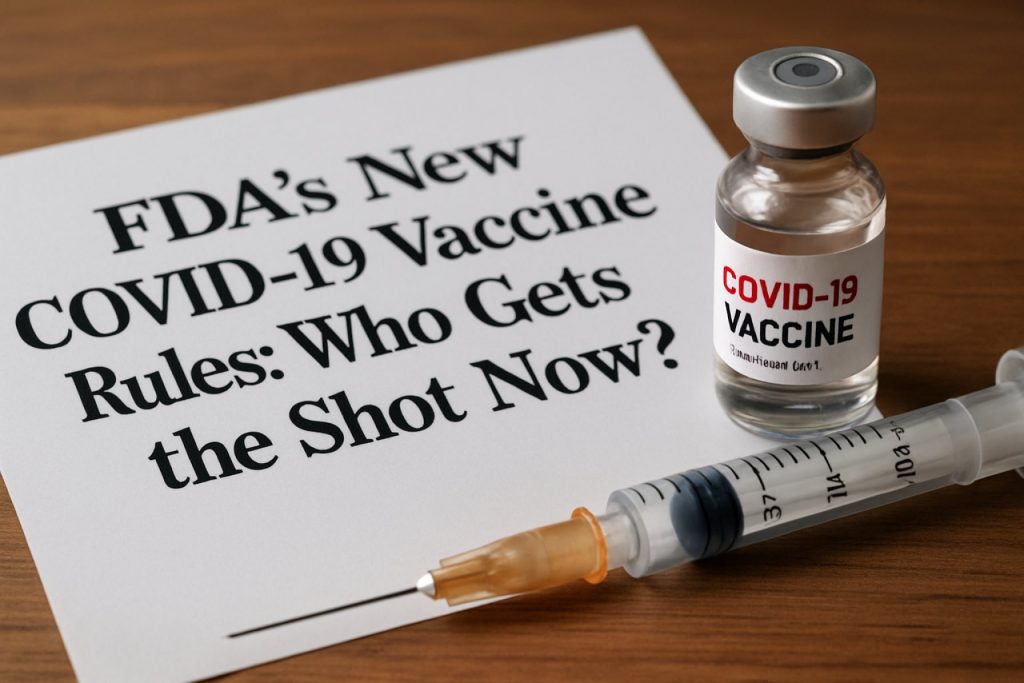
- The FDA now limits annual COVID-19 vaccines to people 65+ and those with high-risk health issues.
- This change aligns U.S. policy with Canada and Australia, narrowing previous, broader recommendations.
- Experts highlight insufficient evidence to justify routine COVID-19 boosters for healthy, low-risk groups.
- Concerns arise over public vaccine skepticism, with warnings not to harm confidence in other vital immunizations.
- The FDA encourages more robust, longer clinical trials before considering widespread boosters for all, but high costs may slow research.
- Older adults and high-risk children remain eligible for annual shots, while the policy could change with future evidence.
American healthcare has taken a sharp turn: The Food and Drug Administration (FDA) has announced sweeping changes on who can receive an annual COVID-19 vaccine shot. In a move watched around the globe, the U.S. will now approve routine COVID-19 vaccination only for people age 65 and older and children or young adults with high-risk health conditions.
The shift signals a strategic alignment with global peers—countries like Canada and Australia have already narrowed their COVID-19 booster recommendations. Yet America’s decision sparks vigorous debate, igniting conversation in medical offices and kitchen tables alike: Should the COVID-19 vaccine be as universally recommended as the annual flu shot?
Dr. Michael Calderwood, an esteemed infectious disease physician at Dartmouth Hitchcock Medical Center, observes, “We don’t have enough evidence, and this is what’s being hotly debated.” His words flutter through circles of public health experts seeking clarity in a changed world. The answer, for now, is more uncertainty—and more research.
- Evidence and Uncertainty: Unlike the well-established influenza vaccine, COVID-19 boosters have less long-term data supporting widespread, repeat doses for healthy, low-risk groups.
- Vaccine Skepticism: Dr. Calderwood notes a worrisome “degradation in the community’s thoughts about vaccine safety.” He warns the FDA hopes to avoid fueling fears that might undermine trust in not only COVID vaccines, but also in long-proven immunizations for diseases like measles.
- Rigorous Research Ahead: The FDA urges vaccine-makers to launch larger, longer clinical trials before seeking approval for low-risk, healthy populations. Yet these studies could cost hundreds of millions—potentially cooling pharmaceutical enthusiasm.
For families already on edge, this new policy sharpens uncertainty: Will access improve if more data emerges? Could future outbreaks shift the calculus again? Behind closed lab doors, the race to gather firmer evidence intensifies.
For now, older adults and at-risk youth will continue to benefit from the yearly shot. For everyone else, questions persist. As Dr. Calderwood and his peers urge patience, only time—and rigorous science—will decide if the FDA swings open these doors again.
Unpacking the FDA’s Bombshell COVID Vaccine Decision: What Aren’t They Telling You?
-
Pros:
-
Evidence-based targeting: By aligning with global peers like
Canada and
Australia, the
Food and Drug Administration focuses resources on the most vulnerable, potentially reducing unnecessary exposure for low-risk groups. - Resource optimization: Prioritizing older adults and at-risk youth could streamline vaccine distribution and monitoring, minimizing healthcare strain.
-
Evidence-based targeting: By aligning with global peers like
-
Cons & Controversies:
- Public confusion: The new policy may deepen uncertainty and erode trust, especially in communities already wary of vaccine safety.
- Lack of universal protection: Healthy adults and low-risk groups may face inconsistent guidance compared to annual flu shot recommendations.
- Equity concerns: Those on the margins (e.g., undiagnosed high-risk conditions) risk missing out on protection, potentially exacerbating health disparities.
-
Limitations:
-
Limited data: As pointed out by experts at
Dartmouth Hitchcock Medical Center, long-term outcomes and benefits for booster shots in healthy populations remain unproven. -
Research and Financial Hurdles: Large-scale studies mandated by the
Food and Drug Administration could slow progress and dampen pharmaceutical innovation.
-
Limited data: As pointed out by experts at
Bottom line: While the FDA’s new policy could mark a smarter, more focused approach to COVID-19 vaccination, it brings along public controversy, scientific uncertainty, and a critical need for more research.
What’s Next for COVID-19 Shots? Surprising Predictions That Could Change Everything
-
Ongoing Research Could Expand Eligibility Again
As current policies rest on limited long-term data, expect a surge in large-scale studies funded or overseen by the FDA. Should trials reveal lasting benefits and safety in broader populations, recommendations may once again widen to include younger, healthier individuals.
-
Global Policy Alignments to Shape U.S. Strategy
The U.S. will likely keep monitoring guidance from major health agencies such as Canada and Australia, adopting or adapting international best practices as new data emerges.
-
Vaccine Technology Advancements
Ongoing innovation from both public health authorities and pharmaceutical developers may introduce new COVID-19 vaccines with improved efficacy, reduced side effects, or more convenient dosing, possibly turning annual vaccination into an easier, more accepted routine.
-
Shifting Public Perception & Education Efforts
Organizations like FDA and respected health centers, such as Dartmouth Hitchcock Medical Center, are poised to increase transparency and education to strengthen public trust in vaccines—a crucial step, especially with growing skepticism.
-
Preparedness for Possible New Outbreaks
Should significant COVID-19 mutations or outbreaks occur, experts predict swift updates to vaccine recommendations and policies, potentially opening eligibility rapidly in response to evolving threats as seen in past waves.
-
Economic and Regulatory Factors
High costs of clinical research could impact the speed of vaccine approval for more people. The pharmaceutical industry, in partnership with regulators like the FDA, must weigh innovation with feasibility—potentially leading to new models for funding and collaboration.
The next chapter of COVID-19 vaccination policy isn’t written yet. Science, society and global experience will chart the path—stay tuned as these forces collide to shape health guidance for years to come.



